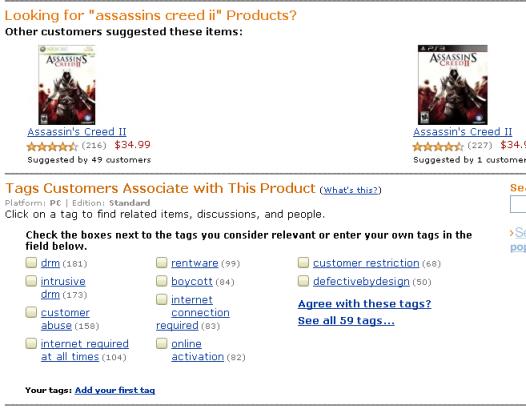Gameplay should mimic music subscription model

The games industry should learn from experience the music industry had to go through in dealing with digital rights management (DRM), and allow users to pay for content access instead of ownership, urges a market analyst.
In an e-mail interview, Gartner's research vice president Mike McGuire, who specializes in DRM, told ZDNet Asia the biggest milestone for DRM was in 2008 when music labels dropped the requirement for music services such as Apple iTunes and Amazon's MP3 store, to sell music with DRM.
The industry today is seeing a move toward content-as-an-application, a model that is increasingly seen with applications developed for the Apple iPhone and Google Android platforms. MOG, Slacker and to an extent Pandora, use this business model, he said.
In the content-as-an-application model, users pay for access to the content through the application, but not for ownership of the content.
McGuire explained that the DRM is hidden from users as they are able to access the Internet content service to create playlists and stream music freely to their PCs and smartphones.
He noted that users can pay to add songs to their mobile devices, which can be played without an Internet connection as they are cached on the users' phone. The DRM deployed ensures the user is not able to take the songs out of the mobile app, he added.
According to the analyst, this model can be applied to games and would extend the game rental model to the online platform. So, instead of paying to rent a DVD and returning the disc when users are done, gamers can rent the application for a period of time and access it online, he said.
However, McGuire noted that this concept will take some time to develop.
He added that some elements of DRM will and should remain in content delivered online such as games, music, movies and TV shows.
For instance, he explained, codes that enable the application to call back and be tracked is not deployed to control or restrict users, but to report on how the content is consumed. This information can benefit companies by enabling new business models for advertising or for product up-selling to users.
Assassins by DRM
DRM, however, has often been embroiled in controversy.
The latest debacle in games emerged with Ubisoft's March 2010 release of Silent Hunter 5 and Assassins' Creed II for the PC. Gamers of both titles are required to be connected, and remain connected to the company's Online Services Platform in order to play the game.
According to the company, most upcoming games from Ubisoft will be rolled out on this online system.
While Ubisoft declined to be interviewed, a spokesperson pointed ZDNet Asia to an FAQ on its "anti-piracy system". In it, the company estimates that the overall games industry loses approximately 15 percent of total revenue as a result of piracy.
It noted that the new system gives "added services" to gamers by allowing unlimited installs, online storage of saved games and not requiring users to have a game disc to play. It added that users can play from any computer as the online platform will recognize gamers' Ubisoft accounts. The system also allows gamers to resume gameplay from their last saved position and automatically saves the updates.
Despite Ubisoft's latest efforts, however, the company's servers came under a security attack on Mar. 9, according to a 3.45am Twitter post by the game publisher, which hours later at 6.09pm, said the systems had been fully restored.
The server downtime sparked DefectiveByDesign.org to instigate Amazon.com members to tag the PC version of Assassins' Creed II on the shopping site, with "defectivebydesign" and "drm". DefectiveByDesign.org is a campaign by Free Software Foundation to oppose DRM installations.

Source: Amazon
In 2008, a similar protest was carried out on Amazon, where shoppers on the site gave Electronic Art's PC version of Spore a one-star rating, due to its DRM tool that locked the game to no more than three PCs. EA later upped the number of machines to five. In December, the game publisher began selling DRM-free versions of Spore.